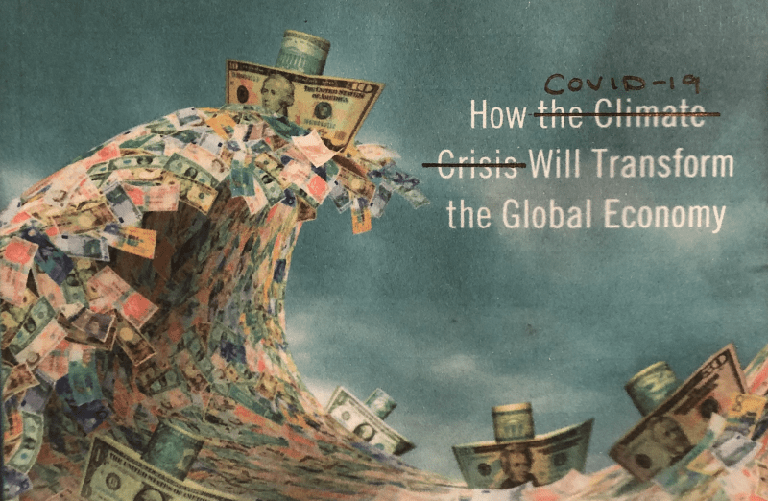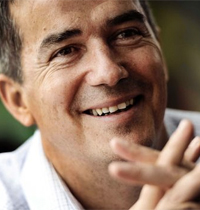“The last global crisis didn’t change the world. But this one could” William Davies
It was always going to come to this. Whether it was a pandemic triggering a shutdown, a climate emergency bursting the carbon bubble, a populist backlash against inequality, wars over water or countless other possible triggers, this moment has long been inevitable.
COVID-19 is just like a match thrown on a tinder dry forest floor on a hot windy day and starting a wildfire. The match isn’t the key – it’s where it lands.
While of course a pandemic would always be an enormous economic and health challenge, the context in which it lands is the key to our ability to manage it. Thus, we now see our economic system’s inherent instabilities clearly exposed. The house of cards is collapsing.
Won’t this all pass? We’ll find a cure, develop a vaccine, boost the economy and then everything will get back to normal. It’ll take a few years, but we’ll get back on track. Right?
Wrong, very wrong.
We are at the beginning of a process with an uncertain end. It could be a major recession, a full-scale depression, or a slide into systemic collapse. Or it could be a turning point – where we recover and build a very different kind of economy, one defined by sustainability and resilience with a focus on improving human well-being. This range of outcomes is uncertain. What is certain is that we are not going back to how things were.
Why?
We should always remember the true meaning of the word ‘unsustainable’. You can never be sure when, or how it will happen, but one thing you can be very sure of is this: when things are unsustainable….they will stop.
When I wrote my book “The Great Disruption” in 2011, I laid out this argument. At that time, I thought the climate crisis was the most predictable trigger point for a crisis that would drive system change. Basic physics showed that increasing emissions would, in the end, force an existential crisis. But like the match, the trigger is not the key. The book’s main focus was the broad global system and its inherent unsustainability – and why a major disruption was inevitable.
In summary the argument I made was this.
An economy and human society built on the concept of infinite compound economic growth was, by itself, obviously ultimately unsustainable. It’s like COVID-19 cases doubling several times a week – in a short time you go from a worrying number, to a collapsed health system and social chaos. On a longer timeframe, it’s the same with infinite economic growth.
On top of that, I argued there were a series of ‘system overload’ points built into our economy – points that when reached would inevitably trigger a system wide crisis.
These included:
- the emissions causing climate change and with it, water shortages, conflict, extreme weather and food crises;
- inequality causing political instability, polarisation and protectionism;
- global poverty causing geopolitical instability, conflict and refugee crises;
- the delusional idea that when things get tough you can just ‘print more money’ – making the house of cards taller, and more unstable.
Thus, we had built a system that, as a whole, behaved in a predictable way. There was always uncertainty what the trigger would be, but certainty that the moment would come. When things are unsustainable… they will stop.
Then comes The Great Disruption.
“Economic contagion is now spreading as fast as the disease itself”-Harvard Business Review – March 2020
Here we are in 2020. The house of cards is tumbling down and the inherent weaknesses of the system are being exposed – making the virus spread faster and the economic crash harder.
- Inequality means the virus spreads faster because of the lack of access to services1;
- Our reliance on centralised fossil fuel supplies, especially oil, exacerbates financial system risks and geopolitical instability as the economy declines2;
- Huge levels of debt, incurred to keep the system afloat, put huge risks into the global financial markets, that the virus’s economic impacts could now tip over the edge3;
- Neo-liberalism’s4 success in reducing both the resources and the authority of the state, leaves many countries ill equipped to manage such a rapidly moving crisis, thereby magnifying the economic crash.
Meanwhile governments vacillate between impossible choices – crash the economy and risk a global depression or crash the health system and kill millions, risking social chaos.
The dreadful thing about the coronavirus is that it is all happening so quickly. This leaves little capacity to reflect on the system wide lessons and how we can avoid spiralling into an ongoing crisis, or worse.
However, like any crisis and deep instability, we owe it to ourselves to understand, and act on, the lessons being learnt. As William Davies5 argued “To experience a crisis is to inhabit a world that is temporarily up for grabs.”
We can no longer prevent the COVID-19 crisis. We can only manage it aggressively to reduce suffering, loss of life and economic impact. However, we can still learn the lessons being thrust in our faces and drive the change needed to prevent future crises. Climate change is still coming at us hard and fast. We can reduce the inequality which will make future crises worse and harder to manage. We can recognise the benefit of our actions and economy being guided by science and expertise rather than ideology. And we can recognise that market economics is a useful tool, but not an ideology nor a way to run our lives – and therefore strong and competent government is central to human progress.
I now find myself with time – thankfully isolated with my family on our farm in rural Tasmania, Australia. So, I will be putting my mind to reflections on these questions and sharing them with you here – in the Cockatoo (Corona) Chronicles.
The future is still ours to make. We can respond to this pandemic by acting to prevent future crises from overwhelming us. We have tinder dry fuel across the whole global system. If we don’t act to reduce it, a fire like this one could one day sweep away all before it.
There will be no vaccine for a global disruption triggered by climate change, inequality or ecosystem degradation. It’s time to pay attention. The Great Disruption is underway.






